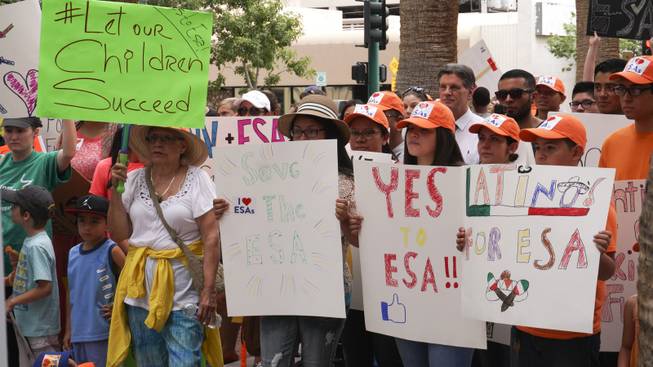
Supporters of the ESA voucher program rally prior to the start of the Nevada Supreme Court hearing on Senate Bill 302 at the Regional Justice Center in Las Vegas, Friday, July 29, 2016.
Wednesday, March 1, 2017 | 2 a.m.
School vouchers are touted by supporters as a way to ensure students in at-risk schools get the same quality of education that their wealthy peers get just by living in affluent neighborhoods.
But data on states that have enacted voucher programs similar to Nevada’s landmark education savings accounts seem to indicate the opposite. The results were summarized in a recent article in The New York Times, but here are the highlights:
• In Louisiana, elementary school students in the Louisiana Scholarship Program posted substantially worse English and math scores during the first year in a private school. In math, student performance dropped more than 20 percentile points the first year, an astounding decrease even when taking into account a modest rebound in scores after year two.
• In Indiana, a locus for the voucher movement and home of the pro-voucher group EdChoice, a yet-to-be-published study by researchers from Notre Dame found that “voucher students who transfer to private schools experience significant losses in mathematics achievement, with null gains in English/language arts in comparison to their achievement gains in their previous public schools.”
Another study by the same researchers last year found that Indiana students transferring to magnet schools and Catholic private schools did worse on average in reading and math.
• In Ohio, a 2016 study by the conservative Thomas B. Fordham Institute and underwritten by the pro-voucher Walton Family Foundation (of Walmart fortune) found that students who used a voucher to attend private schools did worse on state tests than their peers who were eligible for a voucher but chose to remain in public schools.
Voucher supporters assert that the findings don’t say much. For instance, it could be true that the test scores are the result of the disruption students experience simply by changing schools, as an organization representing Indiana’s private schools argued. It may be too early to tell, but opponents say the data do show that the supposed "silver-bullet" of school choice isn’t as clear-cut as it’s often made out to be.
As the Brookings Institution noted in a recent review of the research, “in education as in medicine, ‘first, do no harm’ is a powerful guiding principle.
“A case to use taxpayer funds to send children of low-income parents to private schools is based on an expectation that the outcome will be positive,” wrote Brookings’ Mark Dynarski. “These recent findings point in the other direction.”
The research could be a strong predictor of what might happen in Nevada if Republicans are successful in reviving a hobbled voucher program.
But Nevada’s education savings accounts, and who they aim to serve, is different than states like Louisiana, Ohio or Indiana. Their vouchers are only available to students from families who can qualify under a relatively strict set of income and other requirements. Nevada’s ESA — a modern form of the traditional voucher — is available to nearly everyone in the state.

Join the Discussion:
Check this out for a full explanation of our conversion to the LiveFyre commenting system and instructions on how to sign up for an account.
Full comments policy